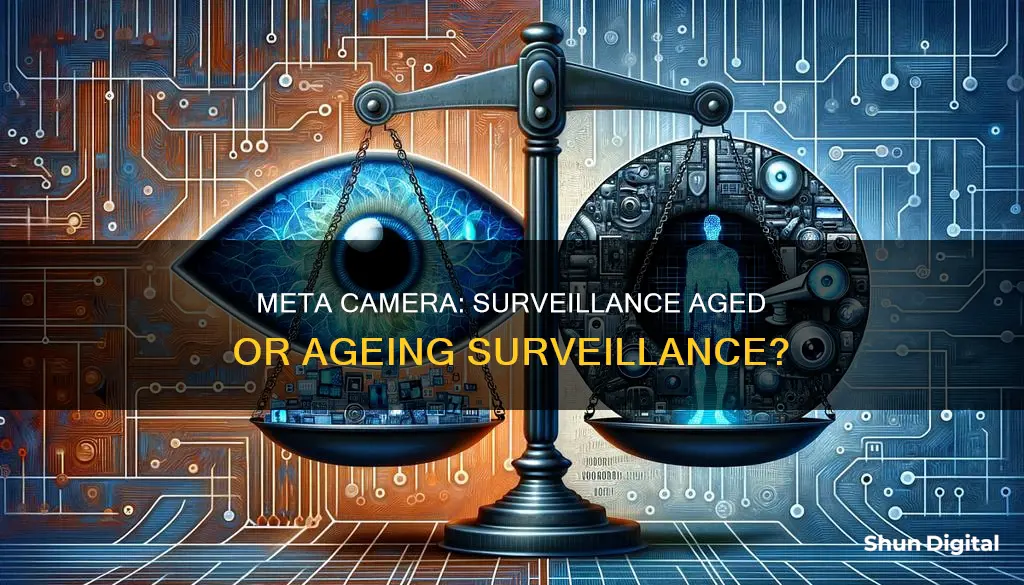
Meta's new face camera has sparked concerns about heralding a new age of surveillance. The $300 Ray-Ban Meta glasses, a collaboration between Mark Zuckerberg's social networking empire and the iconic eyewear maker, offer a built-in camera, speakers, and microphones. While Meta promotes these features as enabling users to live in the moment and share their experiences, critics worry about the privacy implications of such technology. During a two-week test, a reporter for the New York Times was able to secretly capture photos and videos of strangers without their knowledge or consent, raising ethical questions about surveillance and privacy.
| Characteristics | Values |
|---|---|
| Name | Ray-Ban Meta Glasses |
| Price | $300 |
| Features | Camera, speakers, microphones |
| Purpose | To "live in the moment" and share what you see with the world |
| Privacy Concerns | Secretly snapping photos and recording videos of strangers |
| Company Response | Meta took privacy seriously and designed safety measures, including tamper-detection technology |
| Design | Minimalist, sleek, lightweight, and hip |
| Competition | Apple's $3,500 Vision Pro headset |
| Previous Attempts | Google Glass, Spectacles sunglasses by Snap |
What You'll Learn

Meta's new face camera: a new age of surveillance?
Meta's new face camera, in the form of $300 Ray-Ban smart glasses, has sparked concerns about a new age of surveillance. The glasses, created in collaboration with the iconic eyewear maker, feature a camera for capturing photos and videos, as well as speakers and microphones for various functions. While Meta claims that the glasses will help users "live in the moment" by allowing them to share their experiences with the world, critics argue that this technology could lead to a further erosion of privacy.
The glasses have raised concerns about the potential for secret filming and the broader implications for surveillance. During a two-week test, a reporter for the New York Times was able to discreetly take photos and videos of strangers in various public places without anyone noticing. This ease of use and the inconspicuous design of the glasses have led to worries about the potential for invasion of privacy. Meta has addressed these concerns by including a tiny LED light in the frame to indicate when the device is recording or taking photos. However, it is unclear how effective this feature is in preventing covert recording.
In addition to privacy concerns, there are also worries about the potential impact of these glasses on our ability to focus. Even when not actively using the device, the presence of the camera can be distracting. This sense of preoccupation and the constant anticipation of capturing moments can interfere with everyday activities. Furthermore, the design of the glasses may not be suitable for certain situations, such as driving, due to issues with glare from headlights creating a harsh, blue strobe effect.
While the Ray-Ban Meta glasses offer a sleek and comfortable design, the primary issue lies in the trade-off between convenience and privacy. The glasses may capture slice-of-life moments effortlessly, but the potential costs of lost privacy and distraction are significant. It remains to be seen if Meta's new face camera will truly usher in a new age of surveillance or if it will be just another passing trend in the world of technology.
Troubleshooting a Wyze Camera That Won't Charge
You may want to see also

Privacy concerns
The Meta Face Camera has raised several concerns about users' privacy. The device is designed to be worn like a pair of eyeglasses and features cameras, sensors, and microphones to capture the user's surroundings. One of the main concerns is the potential for constant surveillance without individuals' consent. The always-on recording feature allows the device to capture people's actions, conversations, and surroundings without their knowledge, infringing on their privacy rights. This also raises questions about data privacy and ownership, as the device collects vast amounts of data about individuals' behaviors and interactions.
Another concern is the potential use of facial recognition technology, which could be used to identify and track individuals. This further blurs the lines between public and private spaces, making it challenging for individuals to maintain control over their personal information. The proliferation of such devices also highlights the need for comprehensive privacy laws and regulations to protect individuals in the digital sphere.
Additionally, there are ethical considerations, such as informed consent and data ownership. The capacity of the device to record and share information without the awareness of those around the user is a cause for concern. The data collected by the Face Camera, both user-generated and incidental, raises questions about who owns and can access this data, as well as how it can be used or monetized.
The introduction of the Meta Face Camera has broader implications for the erosion of privacy boundaries and the dynamics of personal interactions and social behavior. It underscores the urgency of comprehensive privacy regulations and responsible development and deployment of such technologies.
Latest Camera Raw Update for CS5
You may want to see also

Meta's statement on privacy
Meta has recently updated its Privacy Policy and Terms of Service to make them easier to understand and clearer about how the company uses user information. The company has added more detailed explanations about how it uses and shares information with third parties in its Privacy Policy. Meta has also introduced new controls to manage user experiences, such as who sees user posts and the topics they want to see ads about. The company has stated that it does not sell user information.
Meta's updated Privacy Policy covers Facebook, Instagram, Messenger, and other Meta products, excluding WhatsApp, Workplace, Free Basics, Messenger Kids, and the use of Quest devices without a Facebook account, which have their own privacy policies. The company encourages everyone to read its updated Policy to understand how its practices apply, including up-to-date information about its newer products, such as Shops and Facebook View.
Meta has also introduced the Privacy Center, a place where people can learn more about the company's approach to privacy across its apps and technologies. The Privacy Center is available to everyone who uses Facebook on desktop and mobile and connects directly to Meta's updated Privacy Policy. It serves as a hub for privacy questions, where users can learn about how Meta uses data, make use of privacy controls, and access key account security tips and tools.
In addition to updating its Privacy Policy and introducing the Privacy Center, Meta has also made changes to its controls for privacy. For example, the company has introduced a new setting that makes it easier to manage who sees your posts on Facebook. Now, when someone selects a default audience, that audience selection will apply to new posts created on Facebook unless a different audience is chosen for a specific post.
Meta has stated that privacy is a top priority for the company, especially when designing new products like the Ray-Ban Meta glasses. In a statement, the company said, "We know if we’re going to normalize smart glasses in everyday life, privacy has to come first and be integrated into everything we do." To address privacy concerns, the Ray-Ban Meta glasses include a tiny LED light embedded in the right frame to indicate when the device is recording. This light flashes momentarily when a photo is taken and stays illuminated when a video is being recorded. Meta has also implemented tamper-detection technology to prevent users from covering up the LED light with tape.
Charging the Kodak EasyShare M22: A Step-by-Step Guide
You may want to see also

Mixed-reality headsets
Meta, Apple, and Magic Leap have all been hyping mixed-reality headsets that use cameras to allow their software to interact with objects in the real world. On the one hand, these headsets could change the way we live and work. On the other hand, they raise serious concerns about privacy and distraction.
Meta's recently released Ray-Ban Meta glasses, for example, include a camera for shooting photos and videos, speakers, and microphones for listening to music and making phone calls. While the glasses are stylish and comfortable, they make it easy to secretly snap photos and record videos of strangers without their knowledge or consent. This not only raises ethical concerns but also legal issues, as photographing people without their permission is illegal in many places.
To address privacy concerns, the Ray-Ban Meta glasses include a tiny LED light that indicates when the device is recording. However, this may not be enough to deter users from covering up the light or otherwise tampering with the device. Additionally, the glasses may distract users, even when they are not actively using any of the features.
Despite these concerns, some companies are pushing the boundaries of mixed-reality technology. Varjo, for instance, offers the XR-4 series, which delivers the most immersive mixed-reality experience with photorealistic visual fidelity across a wide field of view. The XR-4 is used to train astronauts, pilots, and nuclear power plant operators and is also applied in car design and research.
While mixed-reality headsets have the potential to revolutionize various industries, companies must carefully consider the ethical implications and implement robust privacy and security measures to protect users and the public.
Duracell AA Batteries: How Long Do They Power Cameras?
You may want to see also

Smart glasses: the future?
Smart glasses are among the rising stars of the tech sphere. As of 2024, there are several models of smart glasses available on the market, with more in development. These include the Ray-Ban Meta Smart Glasses, the Viture Pro XR Glasses, the Rokid Max, the XReal Air 2, the Amazon Echo Frames, and the Nautica Smart Eyewear Powered by Lucyd. Smart glasses can be used for several purposes, including social media, entertainment, productivity, and even as a fashion accessory.
Smart glasses can be equipped with a variety of features, such as cameras, speakers, microphones, and voice assistants. For example, the Ray-Ban Meta Smart Glasses have a 12MP camera, speakers, and microphones, allowing users to take photos, record videos, make calls, and listen to music. The Amazon Echo Frames have built-in microphones and speakers, as well as access to Amazon's voice assistant, Alexa.
One of the main benefits of smart glasses is their small form factor and portability. Unlike VR/AR/MR headsets, smart glasses are small, lightweight, and can be carried and used anywhere. This makes them particularly useful for professionals who need access to information and hands-free communication in their line of work, such as maintenance technicians and surgeons.
However, there are also concerns about the potential privacy implications of smart glasses, especially those with built-in cameras. For example, the Ray-Ban Meta Smart Glasses have been criticised for making it easy for users to secretly record photos and videos of strangers without their knowledge or consent. Additionally, there are concerns about the potential impact of smart glasses on our ability to focus and be present in the moment.
Despite these concerns, smart glasses are expected to become more prevalent in the consumer market, especially as the technology improves and more useful applications are developed. Smart glasses have the potential to change the way we live and work, and they could become as common as smartphones and computers. However, it remains to be seen whether they will fully catch on with consumers or remain a niche product.
Understanding Your Camera's DPI and RAW Settings
You may want to see also
Frequently asked questions
The $300 Ray-Ban Meta glasses are a collaboration between Mark Zuckerberg's social networking empire and the iconic eyewear maker. The glasses include a camera for shooting photos and videos, and an array of speakers and microphones for listening to music and talking on the phone.
The glasses include a tiny LED light embedded in the right frame to indicate when the device is recording. When a photo is snapped, the light flashes momentarily. When a video is recording, the light stays on.
Some people are concerned about the privacy implications of the glasses, while others are worried about the potential for distraction. Some people also think that the glasses don't offer anything new that can't already be done with a smartphone.







